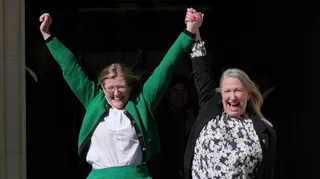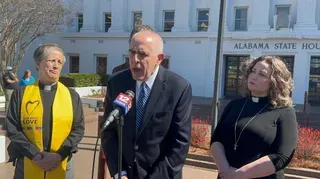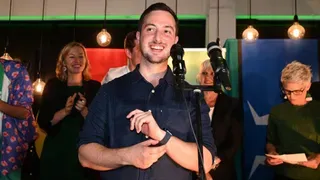May 8, 2008
Gay Penguins Book Tops "Challenged" List Again
Kilian Melloy READ TIME: 3 MIN.
For the second straight year, a tale of a family headed by two dads has received the most complaints from people wishing to see the book pulled from library shelves.
In the case of this particular book, both dads--and their offspring--are penguins.
There are several cases of penguins in zoos pairing up as same-sex couples, going through courtships rituals and, when given an egg to nurture, caring for the egg and the hatchling just as mixed-gender couples do. One famous example of these same-sex penguin families is Harry and Pepper, two penguins who live at the San Francisco zoo.
In 2005, Bremerhaven Zoo in Germany realized that three penguin couples were actually gay males after doing DNA tests and observing one of the couples attempting to foster a rock as though it were an egg.
But it's the tale of Roy and Silo, two male penguins who live in New York, at the Central Park Zoo, and who were given an egg to nurture and then raised the result, a chick named Tango, that became the most famous story of all" story of Roy, Silo, and their daughter Tango was written up as a children's book.
To some, however, that story has become infamous: the tale of Tango and her two gay dads, as related in the book And Tango Makes Three, has drawn the wrath of human beings who object to their own offspring learning about certain aspects of the birds (and the bees), reported The Advocate at its Web site, Advocate.com on May 7.
And Tango makes Three is a children's book about diversity and different family structures. The Advocate.com article notes that the book was written by Justin Richardson and Peter Parnell, and published three years ago. (In real life, as these things happened, Lance and Silo went their separate ways after raising Tango, having spent six years together.)
For the last two of those three years, the book has topped the American Library Association's list of the most "challenged" books--that is to say, the titles that inspire those opposed to the books and the ideas they contain to submit a written request to see the book pulled from library shelves. The ALA calls those written requests "challenges" to books. And Tango Makes Three was the most challenged book in 2006 and again in 2007.
The ALA's Judith Krug, who serves as the director of the organization's office for intellectual Freedom, was quoted in the Advocate article as saying, "The complaints are that young children will believe that homosexuality is a lifestyle that is acceptable."
Added Krug, who spoke on the issue to the Associated Press on May 6, "The people complaining, of course, don't agree with that."
The ALA's definition of a "challenge" to a library book is a "formal, written complaint filed with a library or school requesting that materials be removed because of content or appropriateness," as The Advocate reported.
The GLBT-themed documentary series In The Life featured a sotry last month on the children's book, and on the phenomenon of same-sex couples in the animal world making nests and, sometimes, family units together.
As In The Life noted, Roy and Silo had attempted to hatch a rock shaped like a penguin egg. That was when a zookeeper decided to give them the chance to become parents, by giving them a real egg to foster.
The Advocate article noted that other books topping the 2007 list of most-challenged books included I Know Why the Caged Bird Sings, by Maya Angelou; the widely acknowledged American classic The Adventures of Huckleberry Finn, by Mark Twain; and The Golden Compass, the first volume in a fantasy trilogy by English writer Philip Pullman which is seen by Christians as critical of their faith.
In some cases, efforts to ban books from school libraries succeed, as in the case of a Kentucky school where the Toni Morrison novel Beloved was pulled.
The ALA said that 65 challenged books (and possibly more) were stricken from libraries in 2007.
The Advocate reported that the total number of challenges to library books has been decreasing in recent years. In the 1990s, annual challenges were above the 750 mark; by 2006, the number had fallen to 546; in 2007, the number fell again, to 420.
Said Krug, "The atmosphere is a little better than it used to be."
Added Krug, "I think some of the pressure has been taken off of books by the Internet, because so much is happening on the Internet."
Kilian Melloy serves as EDGE Media Network's Associate Arts Editor and Staff Contributor. His professional memberships include the National Lesbian & Gay Journalists Association, the Boston Online Film Critics Association, The Gay and Lesbian Entertainment Critics Association, and the Boston Theater Critics Association's Elliot Norton Awards Committee.







